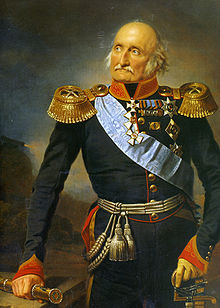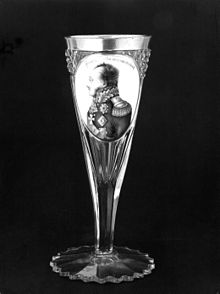Ludwig Adolf Peter zu Sayn-Wittgenstein

Count (since 1834 Prince ) Ludwig Adolph Peter (Pjotr Christianowitsch) zu Sayn-Wittgenstein-Berleburg (* December 25, 1768 July / January 5, 1769 greg. In Nischyn or Perejaslaw , Russian Empire ; † May 30, July / 11 June 1843 greg. Lemberg , Austrian Empire ) was a field marshal general of the Russian army .
Life
His parents were Count Christian Ludwig Casimir von Sayn-Wittgenstein-Berleburg-Ludwigsburg (1725–1797) and his first wife, Countess Amalie Ludowika Finck von Finckenstein (1740–1771).
Wittgenstein was baptized in St. Katharinen , the church of the German Evangelical Lutheran Congregation in Kiev .
In 1781 Wittgenstein began his military service in the Semjonowski regiment , received his first officer rank as cornet in 1790 , sub-lieutenant in 1792, advanced to major of the Ukrainian light cavalry regiment in 1793 and received his baptism of fire in the Polish campaign in 1793, which successfully put down the Kościuszko uprising .
Promoted to colonel in 1798 and major general in 1799, he took over command of the Mariupolski Hussar Regiment in 1800. In 1805 he served in the Russian Corps in support of Austria under the command of Miloradowitsch and Bagration and commanded an outpost at the Battle of Austerlitz . In 1806 he took part in the Russo-Turkish War , fought in the Caucasus and, after the fall of Chotin, had to protect the Russian border from Grodno to Brest .
In 1807 Wittgenstein became lieutenant general and chief of the bodyguard hussar regiment.
In 1812 he had to cover the way from the Daugava to Saint Petersburg with his 1st Infantry Corps as part of the 1st Russian Western Army under Barclay de Tolly , which he succeeded in the battle of Kljastizy . In mid-August he was able to stop the French on the Daugava line in the First Battle of Polotsk . He fought victoriously in the Second Battle of Polotsk (October 20) and then went on the offensive. He won again at Tschaschniki and earned further fame by retaking Vitebsk (November 9th), which was secured by defeating the French corps Oudinot and Laurent de Gouvion Saint-Cyr in the battle of Smoljany (November 14th). He then received orders, together with Chitschagow Napoleon, to cut off the route on the Berezina , which was unsuccessful despite extremely high enemy losses. General Wittgenstein at least managed to surrender a French division, the first in this campaign.
In 1813 Wittgenstein operated with the Prussian army corps under Yorck von Wartenburg and entered Berlin on March 7th . From there, after the death of Kutuzov , he was called to the main army of the allies to take over the supreme command of the Russian and Prussian armies. However, he was not up to this position, in particular the lack of active senior leadership in the battle of Großgörschen proved . After the battle of Bautzen , which was also lost , he offered to resign from the high command. Under his successor, Barclay de Tolly, he commanded the Russian troops in the Bohemian Army after the armistice .
Assigned to clarify the situation in front of Leipzig , he opened the Battle of Nations near Leipzig on October 14th with the great cavalry battle near Wachau, Liebertwolkwitz and Markkleeberg against Marshal Murat, which is commemorated by a memorial stone near Wachau. He commanded together with Barclay de Tolly as "en chef" the infantry corps Eugen von Württemberg and Gortschakow as well as the cavalry corps von der Pahlen . On October 16, he was in command of the troops to the right of the Pleisse , where he wasted his strength. On October 18, under the command of Barclay de Tolly, he advanced against Wachau and Liebertwolkwitz, on October 19, together with the von Kleist associations, he penetrated the Quandt tobacco mill and finally stormed the windmill gate in Leipzig.
Also in the campaign of 1814 he led the 6th Corps in this army under Prince Schwarzenberg and was slightly wounded in the victorious attack on February 27 in the battle of Bar-sur-Aube . Annoyed by the appointment of his former war opponent, Count Carl Philipp von Wrede, who had been defeated by him in Polotsk , as field marshal, he took the wound as an opportunity to leave the army on March 7th .
In 1814 Wittgenstein returned to Russia, and in 1818 became Commander in Chief of the 2nd Army and a member of the State Council . Promoted to field marshal since 1826 , Wittgenstein received supreme command of the Russian troops on the Prut when the war against the Ottomans broke out in 1828 . The result of his operations was that he had to go back across the Danube and in 1829 the supreme command passed to General Count Hans Karl von Diebitsch-Sabalkanski . In 1834 Wittgenstein was elevated to the prince status of Sayn-Wittgenstein -Berleburg-Ludwigsburg by the King of Prussia .
Ludwig Adolph Peter, Prince of Sayn-Wittgenstein, died on June 11, 1843 while traveling in Lemberg.
family
He married on June 27, 1798 in Polotsk Antonia Cäcilie Snarska (born February 28, 1778, † July 27, 1856). The couple had the following children:
- Ludwig Adolf Friedrich (* June 8, 1799 - July 20, 1866), 2nd Prince of Sayn and Wittgenstein, from September 23, 1861, Prince of Sayn-Wittgenstein-Sayn (in Ludwigsburg), Imperial Russian Field Marshal
- ⚭ June 14, 1828 Princess Stefania Radziwiłł (December 9, 1809 - July 26, 1832)
- ⚭ October 23, 1834 Princess Leonilla Ivanovna Baryatinskaya (May 9, 1816 - February 1, 1918)
- Stanislaus, (born June 9, 1800; † January 1820)
- Alexander (August 15, 1803 - May 30, 1858) ⚭ November 12, 1824 Sofija Ivanovna Gorgoli (May 17, 1808 - June 10, 1835)
- Peter
- Georg, (born May 26, 1807; † March 21, 1857) ⚭ August 24, 1835 Princess Emilia Światopełk-Czetwertyńska (* October 20, 1819; † November 24, 1896)
- Alexei, (born August 26, 1810 - † October 10, 1842)
- Nikolaus, (baptized March 10, 1812 - March 10, 1864)
- ⚭ April 26, 1836 (divorced 1855) Karolina Elżbieta Iwanowska (* February 7, 1819 - † March 10, 1887)
- ⚭ January 13, 1857 Maria Vasilievna Michailova (* March 22, 1830 - December 20, 1864)
- Emilie (born June 24, 1801; † May 10, 1869) ⚭ October 26, 1821 Prince Pyotr Ivanovich Trubetskoi (born April 7, 1798; † June 3, 1871)
- Maria
- Elizabeth
- Antonia
literature
- Johannes Burkardt and Ulf Lückel, Das Fürstliches Haus zu Sayn-Wittgenstein-Berleburg , in: Deutsche Fürstenhäuser , Vol. 17, Werl, 2005
- Alexander Graf von Hachenburg Prince zu Sayn and Wittgenstein, Ludwig Adolf Peter Prince zu Sayn and Wittgenstein, Imperial Russian General Field Marshal 1768 / 69-1843 , Walter Dorn Verlag , Hanover, 1934
- Ulf Lückel, Ludwig Adolph Peter Prince of Sayn-Wittgenstein-Berleburg in Ludwigsburg (1769–1843) honored in 2012 in Russia , in: Wittgenstein. Leaves of the Wittgensteiner Heimatverein eV, vol. 100 (2012), vol. 78, pp. 142–144.
Web links
- Article Ludwig Adolf Peter zu Sayn-Wittgenstein in the Great Soviet Encyclopedia (BSE) , 3rd edition 1969–1978 (Russian)
- Family tree at genealogy.euweb.cz
Individual evidence
- ↑ Отечественная война 1812 года: Биографический словарь. - Moscow 2003, Росвоенцентр; Кучково поле; Росспэн, p. 69
- ↑ Tatiana Terjoschina: Do not be afraid, you little flock. The history of the Evangelical Lutheran congregation in Kiev. In: Festschrift for the rededication of the church. Munich 2000. ISBN 3-583-33108-7 , pp. 63–91 (64)
| personal data | |
|---|---|
| SURNAME | Sayn-Wittgenstein, Ludwig Adolf Peter zu |
| ALTERNATIVE NAMES | Sayn-Wittgenstein, Pyotr Christianowitsch Graf too |
| BRIEF DESCRIPTION | Field Marshal General of the Russian Army |
| DATE OF BIRTH | January 5, 1769 |
| PLACE OF BIRTH | Nischyn or Perejaslav , Russian Empire |
| DATE OF DEATH | June 11, 1843 |
| Place of death | Lemberg , Austrian Empire |


